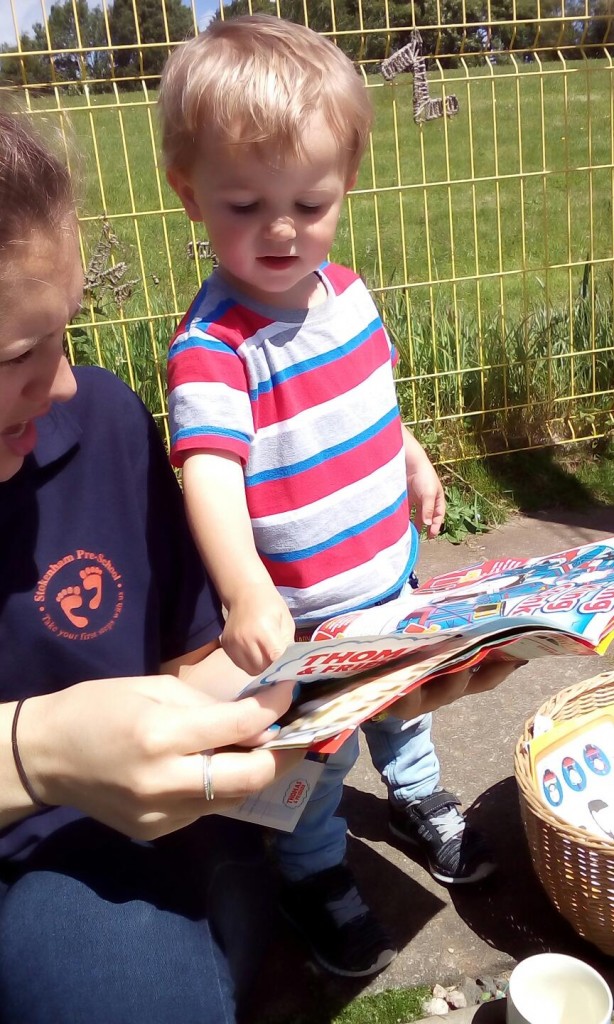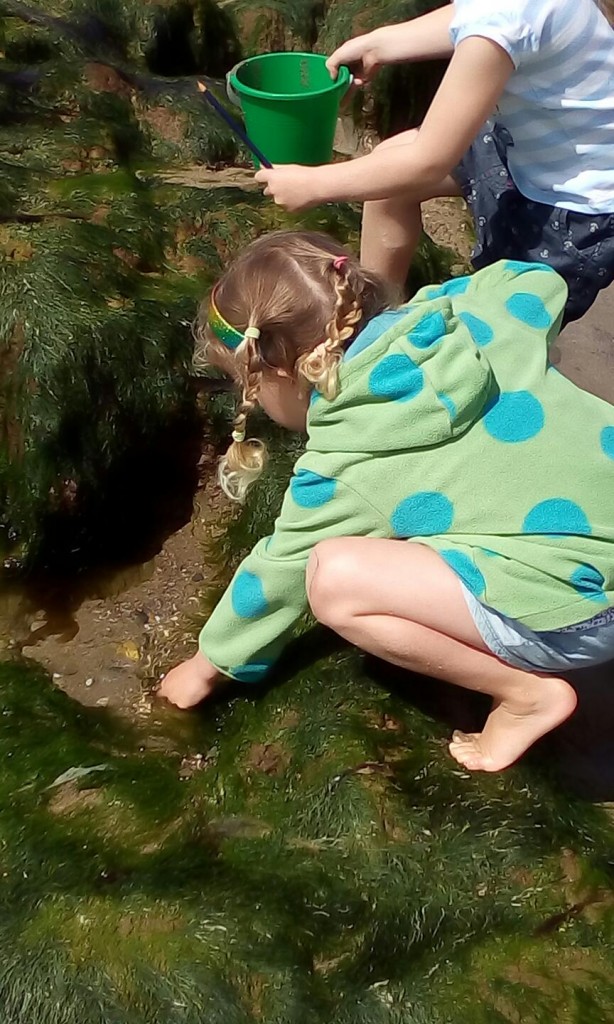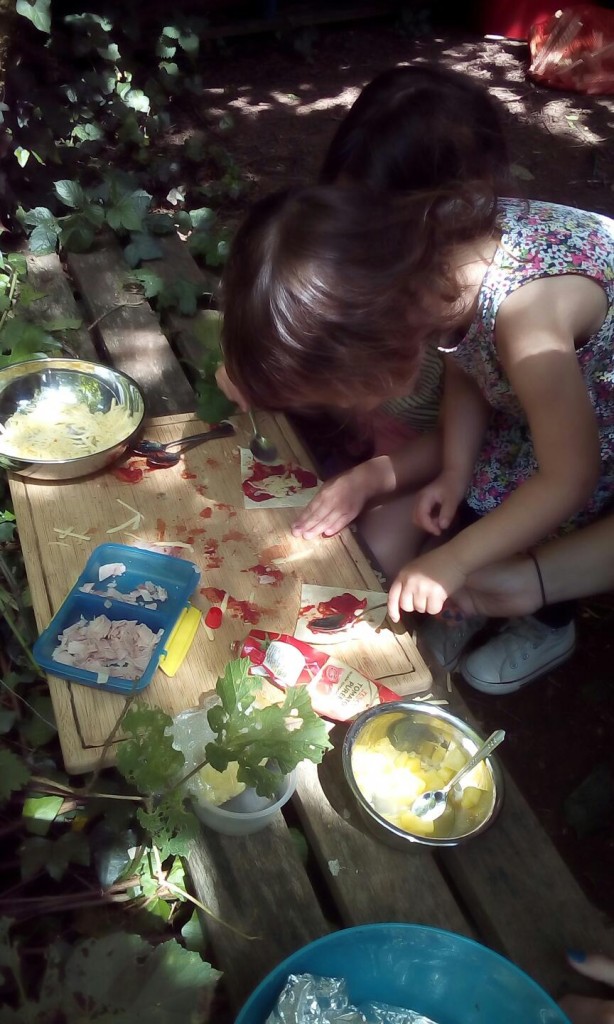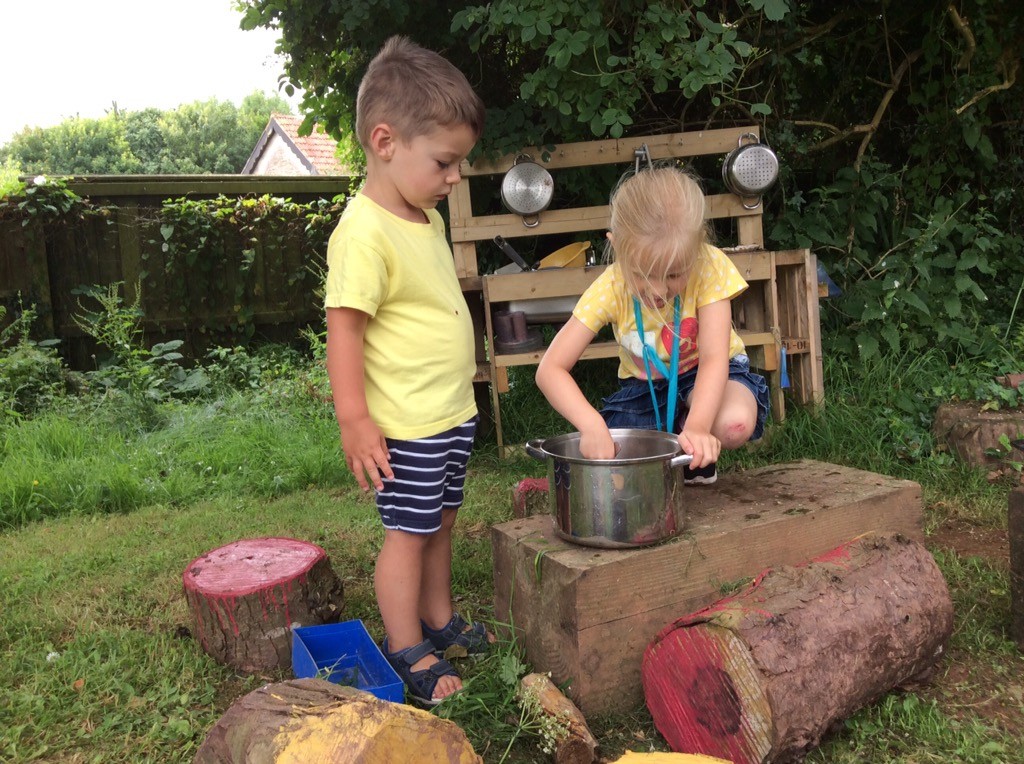Welcome
We are a small, friendly and successful independent pre-school and are happily situated within the grounds of Stokenham Area Primary School.
We have a large building with two rooms for work and play and also benefit from a large outdoor area. Our building is fully insulated and double glazed with eco friendly heating and electrics. Our outdoor space benefits from a beautiful green oak canopied area so that we can play outside come rain or shine.
Established over 40 years, Stokenham Pre-School is proud to be part of the local community.
Our setting aims to:
- provide high quality care and education for children primarily below statutory school age
- work in partnership with parents to help children to learn and develop
We aim to ensure that each child:
- is in a safe and stimulating environment
- is given generous care and attention, because of our ratio of qualified staff to children, as well as volunteer parent helpers
- has the chance to join with other children and adults to live, play, work and learn together
- is helped to take forward her/his learning and development by being helped to build on what she/he already knows and can do
- has a personal key person who makes sure each child makes satisfying progress
- is in a setting that sees parents as partners in helping each child to learn and develop
- is in a setting in which parents help to shape the service it offers
- add to the life and well-being of its local community
- offer children and their parents a service that promotes equality and values diversity
Parents
Our commitment to Parents is for you to feel:
- valued and respected • kept informed
- consulted
- involved
- included at all levels



Children’s development and learning
The Early Years Foundation Stage
The provision for children’s development and learning is guided by the Early Years Foundation Stage (DfE 2024). Our provision reflects the four overarching principles of the Statutory Framework for the Early Years Foundation Stage.
- A Unique Child: Every child is a unique child who is constantly learning
- Positive Relationships: Children learn to be strong and independent through positive relationships.
- Enabling Environments: Children learn and develop well in enabling environments, in which their experiences respond to their individual needs and there is a strong partnership between practitioners, parents and carers.
- Learning and Development: Children develop and learn in different ways and at different rates. The framework covers the education and care of all children in early years provision including children with special educational needs and disabilities.
How we provide for development and learning
Children start to learn about the world around them from the moment they are born. The care and education offered by our setting helps children to continue to do this by providing all of the children with interesting activities that are appropriate for their age and stage of development.
These 3 prime areas – Personal, social and emotional development, Communication and language and Physical development, will help them to develop skills in four specific areas:
- Literacy
- Mathematics
- Understanding the world
- Expressive arts and design
For each area, the guidance sets out early learning goals. which individual children will meet right up to the end of the reception year when the Foundation Stage profile will be completed.
Personal, social and emotional development
This area of children’s development covers:
- making relationships
- sense of self
- understanding emotions
Communication and Language:
- listening and attention
- understanding
- speaking
Physical development
- moving and handling
- health and self-care
Literacy:
- reading
- writing
Mathematics
Understanding the world
- people and communities
- the world
- technology
Expressive, Art and Design
- creating with materials
- being imaginative and expressive
Learning through play
Play helps young children to learn and develop through doing and talking, which research has shown to be the means by which young children learn to think. Our setting uses the development matters leading to the early learning goals to plan and provide a range of play activities, which help children to make progress in each of the areas of learning and development. In some of these activities children decide how they will use the activity and, in others, an adult takes the lead in helping the children to take part in the activity. In all activities information from the children’s individual learning journey has been used to decide what equipment to provide and how to provide it and what is planned.
Assessment
We assess how young children are learning and developing by observing them frequently. We use information that we gain from observations, as well as from photographs or videos of the children to document their progress and where this may be leading them. We believe that parents know their children best and we ask them to contribute to assessment, sharing information about what their children like to do at home and how parents are supporting development.
The progress check at age two
As part of the Early Years Foundation Stage we work with the parents and carers to write a short summary of their child’s development in the three prime areas of learning and development: personal, social and emotional development; physical development; and communication and language; when a child is aged between 24 – 36 months. The key person is responsible for completing the check using information from ongoing observational assessments carried out as part of our everyday practice, taking into account the views of other professionals e.g. Health Visitor.
Key persons and your child
Our setting uses a key person approach. This means that each member of staff has a group of children for whom she/ he is particularly responsible. Your child’s key person will be the person who works with you to make sure that the care and education we provide is right for your child’s particular needs and interests. When your child first starts at the setting, she/he will help your child to settle and throughout your child’s time at the setting, she/he will help your child to benefit from the setting’s activities. All staff make sure that your child is happy and safe in pre-school as well as your child’s key person.
Records of achievement
The setting keeps a record of achievement for each child. Staff and parents work in partnership on their children’s records of achievement which is completed by child’s key person. Your child’s record of achievement helps us to celebrate together her/his achievements and to work together to provide what your child needs for her/his well- being and to make progress.
Your child’s key person will work with you to keep this record. To do this you and she/he will collect information about your child’s needs, activities, interests and achievements. This information will enable the key person to identify your child’s individual needs and stage of development. You and the key person will then decide on how to help your child to move on to the next stage.
How parents take part in the setting
As a member of the Pre-school Learning Alliance, our setting recognises parents as the first and most important educators of their children. All of the staff see themselves as partners with parents in providing care and education for their child. There are many ways in which parents take part in making the setting a welcoming and stimulating place for children and parents, such as:
- exchanging knowledge about their children’s needs, activities, interests and progress with the staff
- sharing their own special interests with the children
- taking part in events and informal discussions about the activities and curriculum provided by the setting
- joining in community activities in which the setting takes part
- building friendships with other parents in the setting
- being a parent helper at daily sessions
- joining the voluntary management committee
What is the limit due to space
In our setting we can take up to 26 children and always ensure that we have the correct staffing levels in line with the Early Years Foundation Stage which is one adult to every 8 children.
Parent helpers are always welcome and are encouraged as it is always good to see what your children are up to.
Staff learning
As well as gaining qualifications in early years care and education, the setting staff take part in further training to help them to keep up to date with thinking about early years care and education.
The setting also keeps itself up to date with best practice in early years care and education through the Pre-school Learning Alliance’s magazine Under 5 and publications produced by the Pre-school Learning Alliance. The current copy of Under 5 is available for you to read.
The setting’s timetable and routines
Our setting believes that care and education are equally important in the experience which we o er children. The routines and activities that make up the session/day in the setting are provided in ways that:
- help each child to feel that she/he is a valued member of the setting
- ensure the safety of each child
- help children to gain from the social experience of being part of a group
- provide children with opportunities to learn and help them to value learning
The sessions
We organise our sessions so that the children can choose from – and work at – a range of activities and, in doing so, build up their ability to select and work through a task to its completion. The children are also helped and encouraged to take part in adult-led small and large group activities, which introduce them to new experiences and help them to gain new skills, as well as helping them to learn to work with others.
Outdoor activities contribute to children’s health, their physical development and their knowledge of the world around them. The children have the opportunity – and are encouraged – to take part in outdoor child-chosen and adult-led activities, as well as those provided in the indoor playroom/s.
The full day
The setting organises the day so that children can take part in a variety of child-initiated and adult-led activities. These take account of children’s changing energy levels throughout the day.
The setting caters for children’s individual needs for rest and quiet activities during the day.
Outdoor activities contribute to children’s health of the world around, their physical development and their knowledge.
Snacks and meals
The setting makes snacks and meals a social time at which children and adults eat together. We plan our snacks so that they provide the children with healthy and nutritious food. Do tell us about your child’s dietary needs and we will make sure that these are met.
Clothing
We provide protective clothing for the children when they play with messy activities. However, it is not always possible to keep your children clean and tidy, so please send your children in clothes that can get messy.
We encourage children to gain the skills that help them to be independent and look after themselves. These include taking themselves to the toilet and taking o – and putting on – outdoor clothes. Clothing that is easy for them to manage will help them to do this. Pre-school T-shirts and sweatshirts are available for purchase from the pre-school at very competitive rates.
Policies
Copies of the setting’s policies and procedures are available for you to see at the setting.
The setting’s policies help us to make sure that the service provided by the setting is a high quality one and that being a member of the setting is an enjoyable and beneficial experience for each child and her/his parents.
The staff and parents committee of the setting work together to adopt the policies and they all have the opportunity to take part in the annual review of the policies, which takes place in the Autumn term. This review helps us to make sure that the policies are enabling the setting to provide a quality service for its members and the local community.
We will take reasonable steps to provide opportunities for children to develop and use their home language in play and learning, supporting their language development at home. We will also ensure that children have sufficient opportunities to learn and reach a good standard of the English language during the EYFS Framework, ensuring children are ready to bene t from opportunities available to them when they start school.
When assessing communication, language and literacy skills, we will assess children’s skills in English, if a child does not have a strong grasp of English language, we will explore the child’s skills in the home language with parents and/or carers to establish whether there is cause for concern about language delay.
Safeguarding children
The children are of paramount importance. We ensure that we follow our safeguarding policy to make sure that the children are kept safe.
Our setting has a duty under the law to help safeguard children against suspected or actual ‘significant harm’.
Our employment practices protect children against the likelihood of abuse in our settings and we have a procedure for managing complaints or allegations against a member of staff.
Special educational needs
As part of the setting’s policy to make sure that its provision meets the needs of each individual child, we take account of any special needs a child may have.
The setting works to the requirements The Special Educational Needs Code of Practice (2001).
Our Special Educational Needs Co-ordinator (SENCO) is: TRACY O’REILLY
The role of the SENCO involves;
- ensuring all practitioners in the setting understand their responsibilities to children with SEN and the settings approach to identifying and meeting SEN
- Advising and supporting colleagues
- ensuring parents are closely involved throughout and that their insights inform action taken by the setting
- liaising with professionals from beyond the setting
SEN support in the early years
In addition to the formal checks, early years practitioners working with children should monitor and review the progress and development of all children.
Practitioners should particularly consider a child’s progress in communication and language, physical development, or personal, social and emotional development – the prime areas of learning and development.
Where progress gives cause for concern practitioners should work in partnership with parents/and or carers to develop a plan to ensure children with SEN receive the right levels of support for their future learning and development. The SEN framework is being updated this year, and is renamed 0-25 SEN code of practice.
The management of our setting
We are run by a committee of parents. The elections for this take place at our Annual General Meeting. The committee is responsible for:
- managing the setting’s finances
- employing and managing the staff
- making sure that the setting has – and works to – policies that help it to provide a high quality service
- making sure that the setting works in partnership with the children’s parentsThe Annual General Meeting is open to the parents of all of the children who attend the setting. It is our shared forum for looking back over the previous year’s activities and shaping the coming year’s plan.
- Details of our committee can be found on our notice board.
Starting at our setting
The first days
We want your child to feel happy and safe with us. To make sure that this is the case, the staff will work with you to decide on how to help your child to settle into the setting. The setting has a policy about helping children to settle into the setting: a copy is included below.
Settling in Pre-school – Policy and Practice
We want children to feel safe and happy in the absence of their parents, to recognise other adults as a positive role model who will help with friendship and to be able to share with their parents afterwards the new learning experiences enjoyed in the pre-school.
In order to accomplish this, we will:
- Encourage parents to visit the pre-school with their children before an admission is planned.
- Introduce flexible admission procedures, if appropriate, to meet the needs of individual families and children.
- Make clear to families from the outset that they will be supported in the pre-school for as long as it takes to settle their child there.
- Reassure parents whose children seem to be taking a long time settling into the pre-school.
- Introduce new families into the group on a staggered basis, for example two new children a day for a week rather than 10 new children all at once.
- Encourage parents, where appropriate, to separate from their children for brief periods at first, gradually building up to longer absences.
We hope that you and your child enjoy being members of our setting and that you both find taking part in our activities interesting and stimulating. The staff are always ready and willing to talk with you about your ideas, views or questions.
Although we welcome parents/carers as helpers, we do not encourage this in the first term.
Children cannot play or learn successfully if they are anxious and unhappy. Our settling procedures aim to help parents to help their children to feel comfortable in the Pre-school, to bene t from what it has to o er, and to be con dent that their parents will return at the end of the session/day.
Stokenham Pre-school opening times
We operate during school term times for children age 2 – 5 years. Monday to Friday – from 9.00am to 3.00pm.
Sessions in that time are as follows :
9.00am – 12pm | 9.00am – 1.00pm | 12pm – 3.00pm | 1.pm – 3.00pm | 9.00am – 3.00pm
We are willing to be flexible to adapt to parents/carers individual needs.
Happy Feet Babies and Toddlers opening times
Looking for a fun, welcoming space to connect with other Parents/carers while your little one plays and explores? Our Parent/carer toddler group is the perfect place!
For children aged 0 – 2 years
- Crafts, music, sensory, malleable play and story time.
- Tea/coffee for the grown ups and fruit and a drink for the little ones
- A great way to meet other families
- Every 2nd and 4th Tuesday of the month, 10.30am – 12.00pm
No need to book – just drop in and say hello, we can’t wait to meet you and your little ones
Fees
For children who are not funded the fees are currently £3.80 an hour, per child. A bill will be issued at the start of each half term (5-7weeks), and we require them to be paid 14 days from receipt of bill. Alternatively bills can be paid each week, (Please speak to the Manager if this causes difficulties.) Payments for any pre-arranged ad-hoc sessions are required on the day of the session being taken. Unfortunately, we cannot give refunds for sessions missed through holidays or illness, as the running expenses of the group will be the same. Payment can be made by cash, cheque or BACS.



